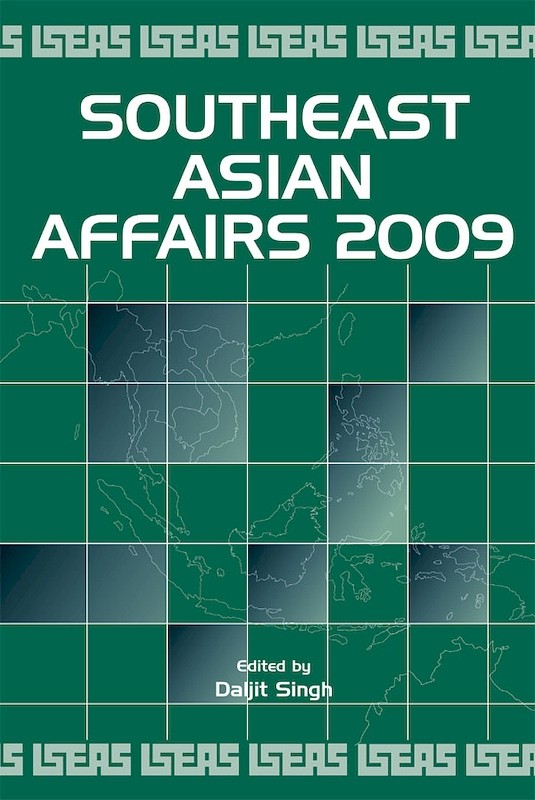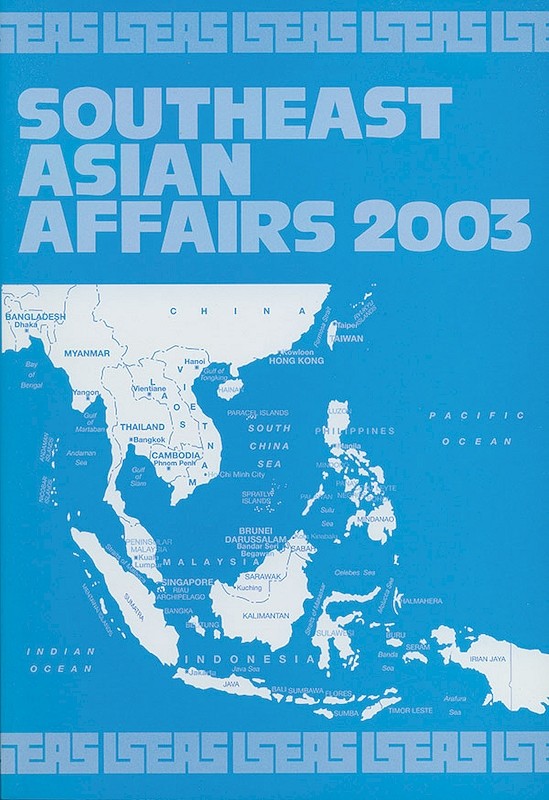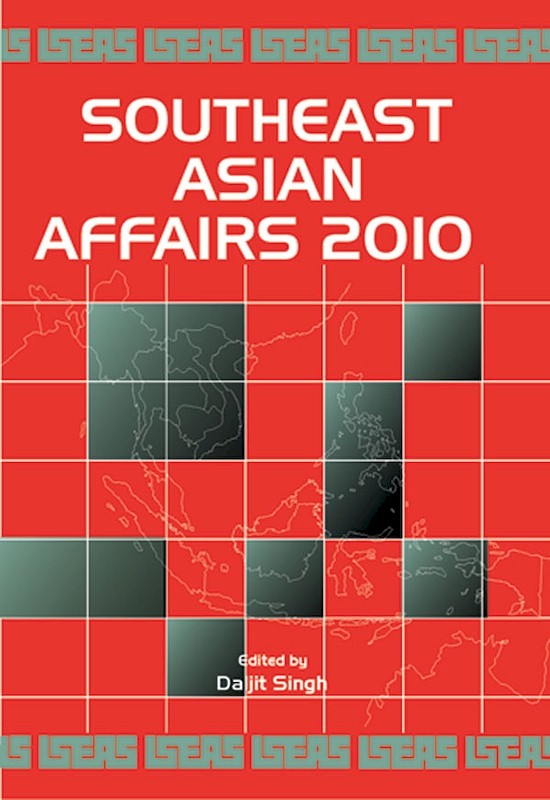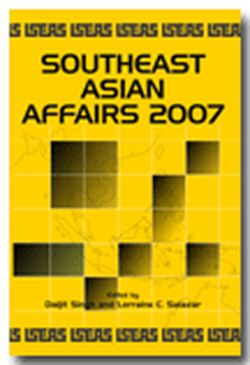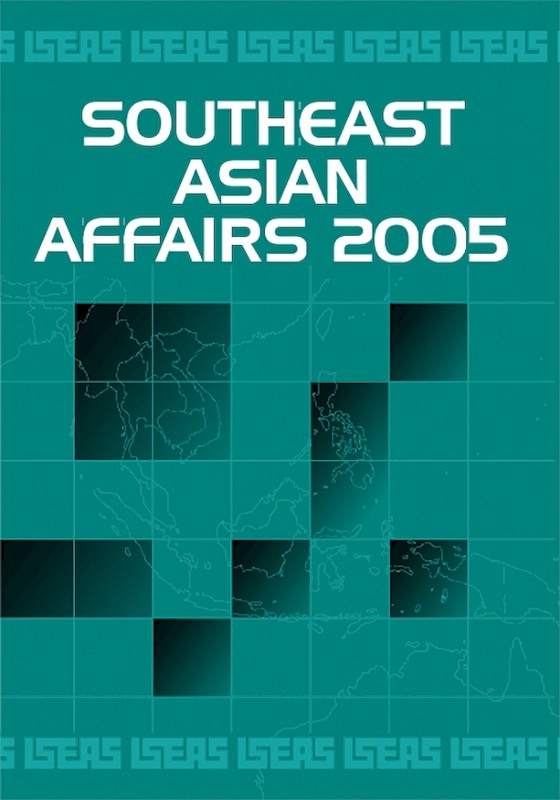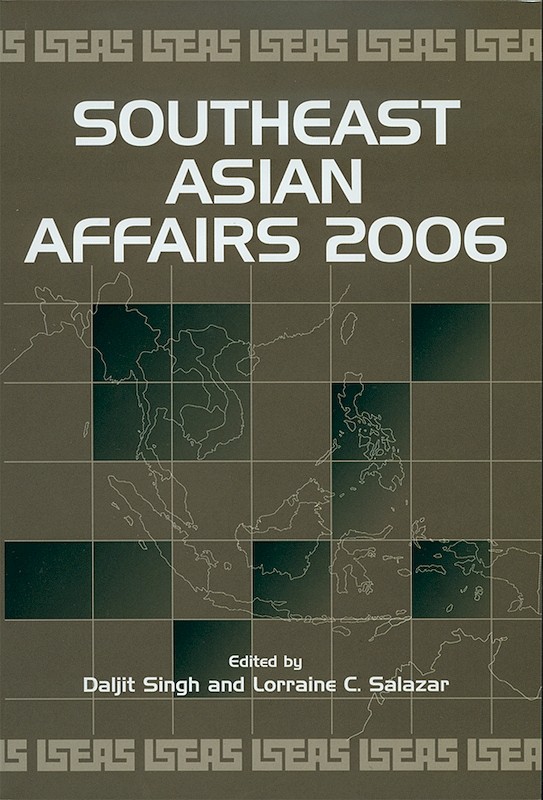Southeast Asian Affairs 2008
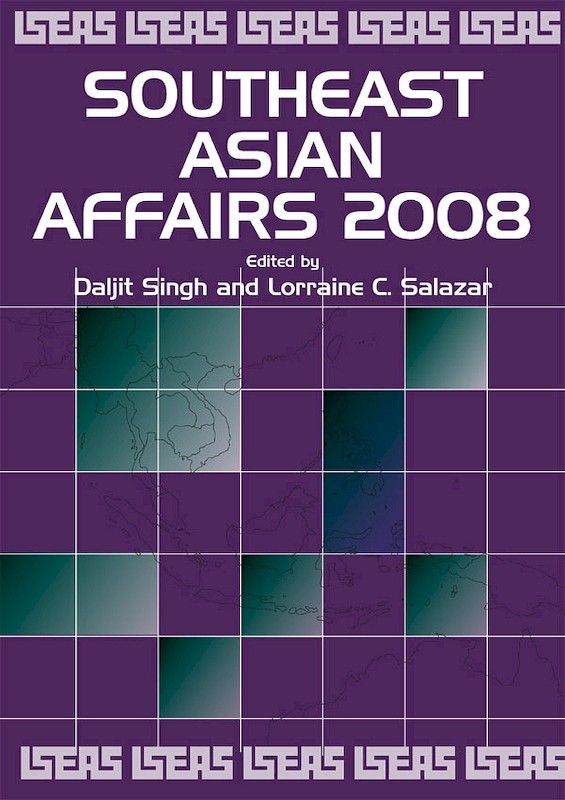
Date of publication:
2008
Number of pages:
393
Code:
SEAA8
About the publication
Since its inception in 1974, Southeast Asian Affairs (SEAA) has been an indispensable annual reference for generations of policy-makers, scholars, analysts, journalists, and others.
Succinctly written by regional and international experts, SEAA illuminates significant issues and events of the previous year in each of the Southeast Asian nations and the region as a whole.
Southeast Asian Affairs 2008 provides an informed and readable analysis of the events and developments in the region in 2007. In the regional section, the first two articles provide the political and economic overview of Southeast Asia. They are followed by an article on Indias geopolitics and Southeast Asia, and two articles on ASEAN. Eleven country reviews as well as four country-specific thematic chapters follow, delving into domestic political, economic, security, and social developments during 2007 and their implications for countries in the region and beyond.
Succinctly written by regional and international experts, SEAA illuminates significant issues and events of the previous year in each of the Southeast Asian nations and the region as a whole.
Southeast Asian Affairs 2008 provides an informed and readable analysis of the events and developments in the region in 2007. In the regional section, the first two articles provide the political and economic overview of Southeast Asia. They are followed by an article on Indias geopolitics and Southeast Asia, and two articles on ASEAN. Eleven country reviews as well as four country-specific thematic chapters follow, delving into domestic political, economic, security, and social developments during 2007 and their implications for countries in the region and beyond.
Contents
-
Southeast Asian Affairs 2008
[Whole Publication] -
Preliminary pages
- THE REGION
-
Southeast Asia in 2007: Domestic Concerns, Delicate Bilateral Relations, and Patchy Regionalism, by Tim J Huxley, author see abstractDuring 2007, issues of domestic stability and internal security continued to preoccupy several Southeast Asian governments, notably in Thailand, the Philippines, Timor-Leste and Myanmar. Indonesia, however, seemed considerably more stable: not only did peace consolidate in Aceh, both the Jemaah Islamiyah terrorist group and piracy in the Malacca Strait seemed to have been subdued. At the same time, relations between Southeast Asian states remained sensitive to domestic political conditions. Largely for this reason, progress towards closer multilateral political and security cooperation was only tentative, despite the Association of Southeast Asian Nations (ASEAN) summit adopting the ASEAN Charter in November 2007. In the light of concern over ASEAN's continuing intramural tensions, the underdeveloped nature of regional security institutions, and concern over the region's changing balance of power, Southeast Asian governments prudently cultivated their extra-regional security links.
-
The Regional Economy: Looking Forward by Looking Back, by Malcolm Cook, author see abstract2007 in Southeast Asia was a year of anniversaries with the two most important being the tenth anniversary of the Asian financial crisis and the fortieth anniversary of the foundation of ASEAN. The ASEAN Free Trade Area is proving to be an important source of ASEAN economic integration, particularly for the new, poorer members and their more protected economies while ASEAN-level free trade negotiations with the major external powers are increasingly driving the trade policies of its member states. The regional legacy of the Asian financial crisis means that today Southeast Asian countries, especially those directly hit by the crisis, are on a slower growth path and are more insulated from the global economy, a global economy in which they are finding it harder to compete. These two anniversaries illustrate powerful trends that will shape the regional economy and its place in East Asia and the globe in 2008 and beyond.
-
India's Geopolitics and Southeast Asian Security, by C Raja Mohan, author see abstractThe last few years have seen the maturation of India's Look East policy launched in the early 1990s. The new international perceptions on India's rise, thanks to sustained high annual economic growth rates in recent years, have begun to inject some dynamism into India's relations with the great powers of Asia - the United States, China and Japan. As a result, India is no longer marginal to either the regional politics of Southeast Asia or the great power system that shapes it. After a tentative start focused on military exchanges, the security cooperation between India and the Asean is beginning to broaden to include more substantive areas like military training and intelligence exchange. India's arms transfers to the region, too, are now on the strategic horizon. As ASEAN tries to construct a broad framework in which the changing balance of power in and around region can be managed, a rising India generates options for Southeast Asia that did not exist before.
- ASEAN AT FORTY
-
ASEAN at Forty: A Balance Sheet, by Rodolfo C Severino, author see abstractASEAN has been hailed by many as the most successful among the regional organizations of the developing world. The worlds leading powers, as well as other countries have sought closer links with it. Yet it has also been criticized, even vilified, for not living up to its promise and potential - at least from the perspective of the critics. The truth, according to Rodolfo Severino, probably lies somewhere in the middle between these two views. In this chapter he sums up ASEANs important achievements over the last forty years.
-
The ASEAN Charter: An Opportunity Missed or One that Cannot Be Missed?, by Mely Caballero-Anthony, author see abstractSince the formal adoption of the much-awaited ASEAN Charter in November 2007, opinions have been mixed about its impact on the institutional development of the 40-year old association. The series of events before and after the adoption of the ASEAN Charter, particularly the demonstrations in Myanmar, had cast doubt on the ability of the grouping to bring about a normative framework for regionalism in Southeast Asia, as well as on ASEANs role as a serious player in the wider Asia-Pacific region. The conservatism reflected in the Charter, as well as the differences that emerged among members have highlighted the obstacles faced by ASEAN in pushing ahead with its vision of building a dynamic three-pillared community. Against these developments, was the Charter was a useful or a futile exercise? Beyond the challenges of bringing about a credible Charter, can ASEAN members see opportunities and find openings for realizing its goals of a just and democratic community.
- BRUNEI DARUSSALAM
-
Brunei Darussalam: Making a Concerted Effort, by Pushpa Thambipillai, author see abstractBrunei Darussalam, as the most peaceful and stable state in Southeast Asia, turned its collective attention on promoting social and economic development so that it would gradually lessen its national dependence on the twin resources of oil and natural gas. Education and training were given top priority so that the young could be trained to fulfil their role, not only in upholding the national philosophy of Malay Islamic Monarchy, but also to equip themselves with the skills for potential employment. Efforts to attract foreign investors were slowly bearing results with the first major investment in a methanol plant, with more major projects to follow in the next years. The leadership under Sultan Haji Hassanal Bolkiah has continued to steer the country towards continued domestic development and active participation in regional and international relations.
- CAMBODIA
-
Cambodia: A Decade after the Coup, by Katharya Um, author see abstractA decade after the sanguinary CPP-led coup that dealt a decisive blow to its coalition partners, Cambodia's progress report is an uneven mix of stability and faltering democratization, of impressive economic growth and widening disparity, and of hopeful steps but limited prospect for systemic change in the foreseeable future. Year 2007 witnessed major developments namely the commune elections and the Khmer Rouge tribunal that finally got underway. While the relative calm before and during the elections evoked some optimism, it was counterbalanced by reports of widespread irregularities. Economically, growth remains sectorally concentrated, principally in the garment and tourist industries, both of which are vulnerable to global shifts. Absence of effective resource management, transparency and accountability continue to be key issues for rights groups and for some donor countries, and to have critical impact on human security.
- INDONESIA
-
Indonesia's Year of Living Normally: Taking the Long View on Indonesia's Progress, by Greg Barton, author see abstractIf 1964 was Indonesia's "year of living dangerously" then 2007 can be said to be Indonesia's "year of living normally". Indonesia's achievements in the decade since the collapse of the Suharto regime in 1998 have seen it overcome not just its recent long-running "multi-dimensional crisis" but also sixty years of unending upheaval and anxiety. But if Indonesia is finally living in normal times it is still far from becoming the sort of nation that Indonesians want it to be. It has overcome terrorism but still struggles with unexpectedly high levels of support for religious violence and retribution. Nevertheless the fact that more than 80 per cent of Indonesian Muslims trust the ulama but only 16 per cent trust the police points to a malaise that has more to do with Indonesia's lack of good governance than it does with religious attitudes. Much work lies ahead lest Indonesia stagnate and fail but progress so far gives grounds for hope.
-
Indonesian State-Owned Enterprises: The Challenge of Reform, by Agung Wicaksono, author see abstractThis chapter examines the challenges that Indonesian government faces in governing the state-owned enterprises (SOEs). Being massive in size and sectoral outreach, Indonesian SOEs unfortunately lag behind their private sector counterparts in performance. Therefore, the government has attempted to reform the SOEs with its three-step programme: to restructure, profitize (make profitable) and privatize the SOEs. Apart from programmes to improve good corporate governance, it also builds a masterplan to streamline the number of SOEs with options including merging the companies and building sectoral holding companies for SOEs in similar or related sectors. The aim is to form a superholding company along the line of Singapores Temasek Holdings and Malaysias Khazanah Nasional as an umbrella for those sectoral holding companies. However, the government of President Susilo Bambang Yudhoyono must be cautious in implementing the masterplan, as democratization has brought wider space for participation of various stakeholders, for example the parliament, in decision-making with regard to the SOEs.
- LAOS
-
Laos: At the Crossroads, by Bertil Lintner, author see abstractThe Lao economy has grown by more than 7 per cent for the past two years driven by foreign investment in the development of the hydroelectric power industry, fast expanding gold and copper mining activity, and a rapidly growing tourism industry. But to graduate from least developed country status, Laos would have to achieve a more even distribution of wealth, improve education and, above all, take stern measures to against corruption. The emergence of a new middle class may also lead to challenges to the monopoly on power by the ruling Lao Peoples Revolutionary Party. The Lao Party and State have arrived at a crucial crossroads, and the twin powerholders can either shed some of their old ways and move forward or resist change, and hope for the best, when a new set of problems and challenges inevitably arise in the wake of the countrys rapid economic progress and social transformation.
- MALAYSIA
-
Malaysia: Abdullah Administration Under Siege, by Lee Hock Guan, author see abstractIn 2007, several developments contributed to the dramatic decline of Prime Minister Abdullah Badawi's and his administration's popularity. UMNO's reversion to promoting the Malay Agenda and Islamization aggravated ethnic relations in the society as well as increasingly alienated the non-Malays and non-Muslims. Public confidence in Abdullah's promise to fight crimes and corruption and reform the police and judiciary plunged as his administration has done and accomplished little. Although economic growth remains credible in 2007, there is growing concern over the rising costs of living and how the mega-projects would impact Abdullah's promise to lower the budget deficits. On the other hand, the opposition forces were reinvigorated by the return of former Deputy Prime Minister Anwar Ibrahim who helped to form alliances between the opposition political parties and between opposition political parties and civil society groups.
-
The Malaysian Economy: Developments and Challenges, by Denis Hew Wei-Yen, author see abstractDespite the fact that the year 2007 was generally seen as a good year for the Malaysian economy, the events that happened in the second half of the year, particularly the U.S. sub-prime mortgage crisis and poor U.S. economic data could trigger an imminent recession in the world's largest economy, could lead to a global economic slowdown in 2008. Against this backdrop, Malaysia's relatively good economic performance in 2007 may be insufficient to guarantee that the country will be immune from the downside risks faced by the rest of the world economy. At the same time, Malaysia is currently going through a challenging period in its economic development as it attempts to maintain its economic competitiveness vis a vis the emerging economies of China, India and Vietnam. To address these challenges, Malaysia has been heavily investing in two ambitious economic corridors projects that could revitalize its economy i.e. the Iskandar Development Region and the Northern Corridor Economic Region. This chapter aims to examine these recent economic developments.
-
"Developmental" States and Economic Growth at the Sub-National Level: The Case of Penang, by Francis E Hutchinson, author see abstractPenang, a small Malaysian state with a population of some 1.5 million, has established a reputation as a dynamic hub for technology-intensive goods such as semiconductors and hard disk drives. Traditionally a centre for shipping, finance, and trade, Penang overhauled its economic model in the 1970s, coming to enjoy a per capita income almost 50 per cent above the national average. Penang's electronics-led economic model is unique, as the interaction and capabilities of firms in the state surpass those of competing clusters elsewhere in the country. This article thus explores whether and how Penang's local political and institutional context aided its electronics industry to develop and, in particular, whether the state government was an active participant in this endeavour.
- MYANMAR
-
Myanmar: Growing Pressure for Change but the Regime Remains Obdurate, by Robert H. Taylor, author see abstractThe largest organized demonstrations, led by Buddhist monks, that Myanmar has experienced since the fall of the socialist government two decades ago failed to have a major impact on the grip of the military regime in Naypyitaw. Despite growing international pressure to open up the political process to allow for a role for Daw Aung San Suu Kyi and her National League for Democracy in formulating any future political order, the State Peace and Development Council remains obdurate. Its seven step road map to a "discipline flourishing democracy" remains the only option available unless and until Daw Aung San Suu Kyi renounces international sanctions on the regime. As the nation's prolonged insurgencies continue to wane, and the economy fails to develop jobs and growth for the bulk of the population, barring the unforeseen, the brief moment when Myanmar was once more at the centre of the worlds attention in September, 2007, appears to have passed with no discernable consequences.
-
Combating the Strategies and Programs of Myanmar's Military Regime: An Economic Analysis, by Ardeth Maung Thawnghmung, author see abstractThe Burmese military regime's brutal crackdown on popular demonstrations in September 2007 has generated intense international condemnation as well as other responses. Most of the criticisms and policy proposals offered in these responses, however, have focused upon political reform. Relatively little in the ways of proposals or even concern has dealt with economic reform, the main grievance of the demonstrations and uprisings. This article seeks to shed light on the roots of the current economic crisis while also analyzing a number of measures taken by the post-1988 military regimes to remedy their difficult and indeed perennial economic problems. It will assess the rationale behind these varying reform measures and their impacts upon Burmese citizens, the economy, and the regime's survival and future prospects. The article emphasizes the need for simultaneously devising new strategies to put pressure upon the Burmese military regime to undertake economic reforms that not only address inefficiencies, mismanagements, but most particularly attune to the needs of the majority of the populations in Myanmar.
- THE PHILIPPINES
-
The Philippines: Weak State, Resilient President, by Patricio N Abinales, author see abstractThe essay explores why Philippine president Gloria Arroyo has managed to remain in power despite the many attempts by her opponents to remove her constitutionally or extra-constitutionally. It differs from the general and academic assessment of Arroyo's presidency as an unstable regime by noting how strength of her ties with local politicians. By making sure that government funds continue to flow down to the local level, Arroyo has managed to keep provincial governors, city and town mayors, and village councils loyal to her. Local support buttressed by the loyalty of her top generals has allowed Arroyo to ride the wave after wave of opposition attacks on her presidency. This, however, is not the case of the opposition. Anti-Arroyo politicians, the Communist Party of the Philippines, Islamic separatists, and certain segments of the military have overlooked the crucial fact that all Philippine politics is local. Thus every attempt has fizzled not simply because of in-fighting within the opposition or a lack of resources; their denouement has as much to do with the oppositions inability to forge viable and lasting links with the wielders of local power.
- SINGAPORE
-
Singapore in 2007: Success at Home, Challenges from Abroad, by Bilveer Singh, author see abstractSingapore's all-round achievements in 2007 were laudable. Yet, at the same time, there were many tell-tales that not all was well. Singapore's rapid progress on the economic front, its high international political standing, diplomatic activism, including its Chairmanship of the ASEAN Standing Committee, were some of the high water marks worthy of mention. Yet, at the same time, trouble appeared to be brewing on a number of fronts. The NKF saga, including the discovery of irregularities in a number of other charities, called into question the squeaky-clean image the Republic had always projected. The discovery of self-radicalized terrorists in Singapore also highlighted the need to be vigilant on this front as non-conventional threats could arise from anywhere. Diplomatically, Singapore was also spotlighted as a result of the outburst of the monks-led demonstrations in Myanmar and their subsequent repression by the military junta. Regionally, a major failure became evident in its relations with Indonesia following the abortion of the Extradition Treaty and Defence Cooperation Agreement that were to signal a new summit in terms of bilateral relations. With Malaysia, Singapore contested its northern neighbour's claim to Pedra Branca at the International Court of Justice, whose decision later in 2008 would have important implications in Singapore-Kuala Lumpur ties. In short, despite being a shining diamond, there were many imperfections that need to be taken cognizant of, with important consequences for the future in terms of national governance and international relations.
- THAILAND
-
Thailand: The State of Anxiety, by Duncan McCargo, author see abstractMost Thais spent much of 2007 in a state of anxiety, deeply concerned about the country's political and economic direction. The year was dominated by a series of high-profile political developments: the dissolution of the former ruling party, Thai Rak Thai, and the banning of its executive members - including ex-PM Thaksin Shinawatra - from holding political office for five years; the promulgation of a new constitution, approved in an unprecedented national referendum; the emergence of a new group of political parties, including the People's Power Party (a TRT-lookalike); and the end-of-year general election that saw pro-Thaksin forces returned to power fifteen months after the 2006 military coup. Throughout the year, the economy remained in the doldrums and public mood was sombre. Whilst physically absent in self-imposed exile, Thaksin succeeded in setting the news all year long, especially following his June purchase of the English premier league football club Manchester City.
- TIMOR-LESTE
-
Timor Leste: A Year of Democratic Elections, by Jose Cornelio Guterres, author see abstractThis review focuses on the 2007 democratic elections and their impact on the socio-economic as well as the political development of the country. Most Timorese were well aware of the importance of the two democratic elections in 2007 in Timor-Leste. Men and women queued for hours to register and to vote without any violence. As citizens, they did not want to lose their rights to vote once in five years to elect their leaders. Most of the political leaders showed maturity in contesting in the elections. UNMIT, UNPOL, and other UN agencies, programmes and funds extended their very significant contribution in terms of security, technical and logistic assistance to the successful conduct of the election process. However, the opposition to the formation of the AMP government in the Fretilin Party has remained a big challenge for the government. The Fretilin political leaders and their supporters can make use of various problems that still exist in the country to impede or even try to overthrow the AMP government which, in their perception, is an unconstitutional government.
- VIETNAM
-
Vietnam: Arriving in the World and a Crossroads, by Alexander Vuving, author see abstractThis article assesses major developments in Vietnams politics, economy, society and foreign relations that took place in 2007. With the accession to the WTO in January and non-state-sponsored anti-China street protests in December, the year 2007 could go down as a watershed in Vietnams post-Cold War history. The accession to the WTO marked the full integration of Vietnam into the Western-dominated international system, closing a protracted process that began twenty years ago. The anti-China protests demonstrated the re-emergence of nationalism that has been restricted by Vietnams communist regime since the demise of the socialist world system also 20 years ago. Vietnams politics and foreign relations reflected the clash between the survival impulse of an anachronistic regime and the needs for international compliance, democratization and efficiency and the rise of nationalism. The new developments suggest that Vietnam has just arrived in the world but already stood at a crossroads.

